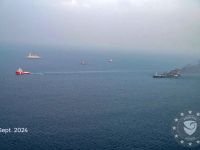Veteran German film director Werner Herzog said on Friday he wanted to show in his new romantic drama the other side of the sweeping Middle Eastern landscape that is at present portrayed in the news headlines.
"What we see is a world that has been demonized and vilified in the media recently. Of course there are reasons for that, but we show another side," Herzog said at a pss conference marking the premiere of the film, Queen of the Desert, at the Berlin Film Festival.
"The desert was not filmed like this before. We even filmed in a real sand storm," said Herzog, who added that the brutal efforts of Islamic State to forge a caliphate in Syria and Iraq underlined the importance of the region's borders, many of which dated back to the 1920's.
The movie stars Hollywood actress Nicole Kidman as the writer and British secret service operative, Gertrude Bell, who has also been dubbed as a female Lawrence of Arabia for her role in shaping a new political order in the Middle East following the end of the First World War and the collapse of the Ottoman Empire.
"What was so beautiful about this movie is that you see what an exquisite area it is. I have always felt this pull for the desert," said Kidman, who said she had begged Herzog to let her have scene taking a bath in the desert as the real Gertrude Bell had done.
This year's Berlinale has a focus on films about strong women in difficult situations.
Spanish director Isabel Coixet's adventure drama about two women struggling to survive in one of the world's most inhospitable regions opened the festival on Thursday.
"I should have done more films about female protagonists much earlier in my life," Herzog said, whose films include such cinematic classics as Fitzcarraldo, about a robber baron in Peru, and The Enigma of Kaspar Hauser, about a man locked in a cellar for 17 years.
"I always thought I was a director for men," said Herzog, who was a leader of the 1970s new wave in German cinema.
Queen of the Desert, which also stars US actor James Franco as well as Britain's Robert Pattison as TE Lawrence, repsents a substantial break from the other almost 20 feature films that Herzog has made during his long career.
After eschewing the US motion picture studio system for most of his time as a director, Herzog's Queen of the Desert is an epic drama in the Hollywood style.
"It was the first movie that Werner has done a love story," said Franco. "It was fun to watch him trying to figure out the scenes, which he did not have much experience with."
But judging by the reaction at the pss screening of the film, Herzog was not always successful in working out the some of romantic scenes, which led to sniggers and laughs among many of the movie critics.
Queen of the Desert also launched the German film industry's hopes for top honours at this year's Berlinale: it is one of three films from German directors competing in the 19-movie race for the Berlinale's pstigious Golden Bear for best feature film.
This includes new movies from actor-turned-director Sebastian Schippers and Andreas Dresen.
New movies from German directors Oliver Hirschbiegel and Wim Wenders are to be screened out of competition, which rules them out for the festival's top prizes.
With a film career dating back to his teenage years, Herzog has also emerged as something of a cult figure in the movie industry following claims that he hypnotized his cast during the making of his 1976 film Heart of Glass.
There followed stories that he insisted on dragging a steam ship over a mountain to film Fitzcarraldo in 1982 and threatened to shoot his lead actor Klaus Kinski if he walked off set.
"We got off easy," said Franco. "We did not have eat any bugs or haul any boats over rocks."
But Queen of the Desert does include a rather aggressive vulture that Herzog wrote into the script after seeing it with its owner on the side of the road during filming in Morocco.
Herzog's film traces Bell's life after she grew impatient with the mannered world of the British aristocracy at the turn of the last century before becoming a diplomat in Tehran and then explorer after a tragic love affair.
A more modern picture of Tehran emerged in another competition movie screened at the Berlinale on Friday, which was Taxi by Jafar Panahi, who was banned in 2011 from making films in his native Iran.
But Panahi continues to defy the ban, this time by turning himself into a taxi driver, filming an often humorous and a diverse range of passengers to produce a vibrant portrait of the Iranian capital.
By Andrew McCathie








